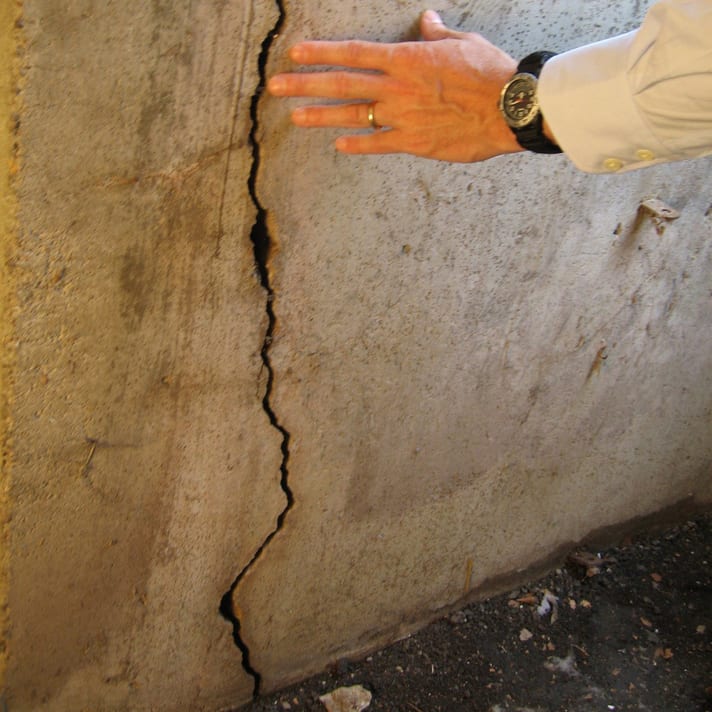What Causes Concrete Foundation Cracks?
Although our homes are built to be resilient to many things, after some time they tend to wear down. In the same way we show signs of age through wrinkles, our homes show it through imperfections and cracks. With the flaws of imperfect construction, pressure surrounding the home and the weight of the house bearing down on it, the foundation of your home takes it all. When it comes to foundation cracks or repairs, the important thing is to take care of the issue as soon as possible. It’s not a good idea to forget about it and wait until the crack gets bigger and allows water to leak into your basement and flood your home.
All concrete has the tendency to crack and there is no way to produce crack-free concrete. Concrete expands and shrinks with changes in temperature and moisture and this can cause cracking early on. Often concrete foundation cracks are not detected until long after they’ve formed. Regardless of how long the crack has been there, it tends to concern homeowners and they worry about the imperfection.
Cracks in concrete foundation most often appear at weak points like corners, basement window frames, walls and pipe areas. It’s important to keep track of these cracks and notice if they are getting bigger. It’s also important to understand why the crack showed up in the first place. What causes concrete foundation cracks? Read on to find out!

Top Causes of Concrete Foundation Cracks
Drought or too much moisture
Soil shrinks like a sponge when moisture is removed from it and when that happens it pulls away from the foundation of your home creating a gap. This gap allows for the foundation to move. When the foundation of a home is not supported properly it can shift around and cracks will begin to appear. In turn, if there is too much moisture it will cause the soil that is supporting the foundation of your home to expand.
Earthquakes
When an earthquake occurs it causes the ground to shake, which in turn shakes your home around. Thankfully not too many earthquakes occur on this side of the U.S., however even the tiniest of quivers can be an issue. Remember, if the foundation isn’t supported or stable, it can move around, weaken and crack. A small earthquake may not cause new cracks, but it can intensify ones that are already present.
Storms
Whether you experience a hurricane, a nor’easter or just a typical rainstorm these storms produce a lot of water, which can damage the foundation of your home. Too much water will force the soil around the foundation of your home to expand, which will push up against the home and cause concrete foundation cracks. Storms can also cause various other structural problems if you don’t take preventive measures to secure your home. One of the most popular explanations behind concrete foundation cracks is the freeze and thaw cycle during the winter. Concrete freezes at around 18 degrees and then it melts at around 35 degrees, which is when the cracking develops.
Plumbing Leaks
It’s important to make sure your pipes are secured and aren’t leaking and that you don’t have any plumbing leaks in your home. If you’re home isn’t equipped with basement waterproofing or a sump pump, the excess water will add to the soil causing it to expand and push against your foundation.
Flooding
Regardless of whether the flooding comes from a storm, a leak, inadequate drainage or something else, too much water will be a problem for your concrete foundation. When hydrostatic pressure becomes too much for the foundation of your home you will notice more leaks, more cracks and more problems.
Extreme Heat
Concrete can also crack under extreme sun and heat because it causes the concrete to expand. During the day and under the sun the concrete will expand, and then overnight the concrete will shrink and retreat back to its original unbaked position.
Get Help Fixing Your Cracks
The moral of the story is that it is important to keep your foundation stable, dry and supported.
When your foundation has wiggle room due to dry soil or if it’s tightly pushed in by expanding soil, these movements cause it to weaken and in turn create concrete foundation cracks. The good news is that concrete foundation cracks that are a result of too much moisture and flooding can be prevented through various methods of basement waterproofing.
It’s also not too difficult to repair concrete foundation cracks with epoxy injections. If you are thinking about preventive measures or you need concrete repair, then contact the team at Triad Basement Waterproofing and they will create a custom solution to your specific situation.
